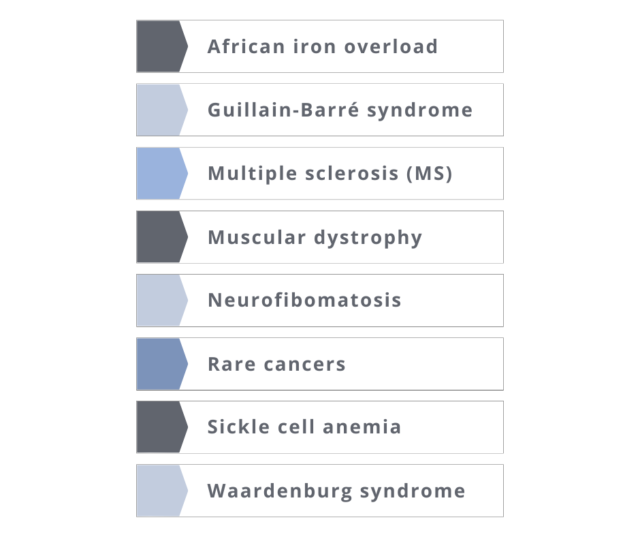Our Goals
HECI Medicine Incorporated is dedicated to providing the following services:
- Providing affordable medication and genetic testing to patients with rare diseases in Africa.
- Collaborating with patient groups and the scientific community to accelerate drug development for rare diseases therapies that affect populations in sub-Sahara Africa.
- Providing research grants to researchers in universities and research institutions based in Africa who work on rare diseases with a goal of encouraging them to bolster research on rare diseases.
- Providing training grants to physicians and nurses based in Africa who provide care to rare disease patients. This will help improve their knowledge and awareness of the current rare disease prevalence and burden, diagnosis, and management.
HECI Medicine Represents the Following Rare Diseases:

Rare Diseases in Africa
The continent of Africa remains highly affected by rare diseases. With the high presence of communicable diseases, such as malaria, as well as the rise of chronic non communicable diseases create further issues for those affected by rare conditions, as funds and resources are limited. Currently there is no rare diseases registry in Africa.
Together they are one of the largest under-served patient populations in the world and pose a significant medical and economic burden for patients and communities. They also affect the most vulnerable among us: about half of all rare diseases begin in childhood, and many patients endure life-long suffering. The worst most, rare diseases often results in a shorter lifespan, and around 1-3 children with a rare disease will not live beyond their fifth birthday.


Rare disease patients in Africa especially in rural areas are often neglected due to lack of resources. In Africa, diagnosis and treatment are also limited and underfunded, which means there are usually prolonged delays in patient care. While, in Western countries, there has been rapid progress in the treatment of rare diseases. This has not been true, in Africa due to lack of resources. As there is a lack of access to healthcare and essential medicines in developing countries, treatment, and research for rare diseases and conditions is usually far from a top priority. Furthermore, the price of many of these drugs are unaffordable to the population in need, especially in Africa. Distance and lack of infrastructure are also massive barriers to increasing access to these drugs.
In Africa, rare diseases not only affect the patient but also the physicians and healthcare system in general. The scarcity of knowledge, guidelines, and training on rare diseases makes the diagnosis and management of these diseases difficult. Investing in rare diseases that has significant benefits for their health now, in the future, and for their ability to raise healthy families. Therefore, we aim to provide affordable medicine and diagnostic tools to patients in Africa affected by rare diseases. We also aim to develop therapeutic drugs for rare diseases that specifically affect Africa using drug repurposing techniques with aim of providing affordable treatment and at a much faster rate.




